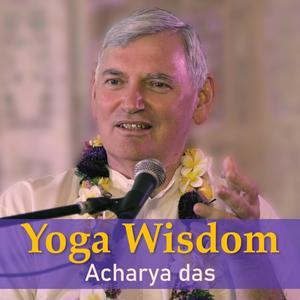331 episodes
- This is quite a long talk, on a very fascinating topic, delivered by Acharya das in the Philippines. It is a comprehensive look into the question of spiritual identity, God-realization, and the resultant experience of the awakening of transcendental and ecstatic love for God which naturally arises from that.
Acharya das outlines three essential questions for self-realization: What is my essence? (spiritual being), What is my position? (subservient part and parcel of God, not the center of everything), and What is my natural function? (to love and serve). He described how material consciousness leads people to try becoming "mini-gods," placing themselves at the center of “their” universe, which ultimately results in emptiness and unhappiness.
Regarding God-realization, he explained three aspects of God's manifestation: Brahman (impersonal spiritual energy), Paramatma (the expansion of God within the heart of all beings), and Bhagavan (the personal form of God in a spiritual realm). The speaker emphasized that love is an exchange between persons and that every soul has an eternal and intimate connection with God who is their true soulmate.
He next explains that pure love for God already exists within everyone's heart and doesn't need to be acquired from external sources. Through the process of bhakti-yoga (devotional practice), particularly chanting God's holy names, this dormant love naturally awakens as the heart becomes purified.
Some of the verses he quoted or which support this topic:
God - He is the eternal among all eternal entities, and the chief conscious being among all conscious beings. Among the many living entities, He is the chief, who fulfills their desires. Śvetāsvatara Upaniṣad 6.13 & Kaṭha Upaniṣad 2.2.13
The same jīva (spirit-soul) is eternal and is for eternity and without a beginning joined to the Supreme Lord by the tie of an eternal kinship. He is transcendental spiritual potency. - Śrī Brahma-saṁhitā 5.21
Learned transcendentalists who know the Absolute Truth call this nondual substance Brahman, Paramātmā or Bhagavān. ‐ Bhāgavata Purāṇa 1.2.11
“Pure love for Kṛṣṇa is eternally established in the hearts of the living entities. It is not something to be gained from another source. When the heart is purified by hearing and chanting, this love naturally awakens. — Śrī Caitanya-caritāmṛta, Madhya-līlā 22.107
“By chanting the holy name of the Lord, one dissolves his entanglement in material activities. After this, one becomes very attracted to Krishna, and thus dormant love for Krishna is awakened.” — Śrī Caitanya-caritāmṛta, Madhya-līlā 15.109
CHAPTERS
00:01:13 Introduction to Soul vs. Body Identity
00:05:47The Reality of Death and Eternal Nature of the Soul
00:09:33 The Vedic Teaching on Individual Soul and Supreme Soul
00:14:07 Self-Realization: Understanding Essence, Position, and Function
00:21:34 The Problem of Material Consciousness and Mini-God Mentality
00:27:40 Natural Function: The Joy of Service and Giving
00:34:18 Three Aspects of God: Brahman, Paramatma, and Bhagavan
00:41:22 The Eternal Relationship and Two Birds Analogy
00:51:39 The Supreme Teaching of Love and Common Misconceptions
00:55:05 The Nature of Love and Three Aspects of God Continued
00:56:52 The Process of Awakening Dormant Love
01:01:10 Sadhana Bhakti: The Practice of Devotional Service
01:05:12 Meditation as Spiritual Immersion, Not Mental Activity
01:23:29 Kirtan - This is a Q&A session from the Soul Searchers Retreat. Acharya das delivers a comprehensive discussion on spiritual life versus material life, emphasizing the fundamental distinction between material consciousness (identifying with the physical body) and spiritual consciousness (recognizing oneself as an eternal spiritual being). He explains that material life is founded on the belief that "I am material," while spirituality recognizes "I'm an eternal spiritual being." A wide range of topics were addressed (as you can see from the chapters listed below) including the concept of karma yoga which was introduced as a process of integrating life activities with spiritual practice by offering all actions as service to a higher spiritual reality.
**************************************
CHAPTERS
00:00 Distinguishing Material and Spiritual Life
02:39 The Concept of Karma Yoga
04:09 The Bhagavad Gita: Arjuna's Dilemma
05:42 Arjuna's Breakdown and Krishna's Response
08:24 Krishna's Teaching on Duty and Nature
09:46 The Radical Teaching of Spiritual Action
11:23 The Lesson of Utilizing Our Tools
12:42 The Fundamental Shift in Consciousness
14:06 Two Schools of Thought: Traditional vs. Advaita
15:43 Critique of the "I Am God" Philosophy
17:05 Qualitative Oneness vs. Quantitative Difference
18:31 The Complete Whole Principle
21:40 The Appeal of False God-Realization
22:58 Three Aspects of Self-Realization
23:56 The Inevitable Fall from Impersonal Realization
25:37 Three Features of the Absolute Truth
27:30 The Nature of Transcendental Connection
29:40 Comparing Levels of Transcendental Happiness
31:27 Rejection of Blind Faith
32:42 The Problem of Consciousness Filters
33:26 Indescribable Spiritual Delights
34:52 The Importance of Questioning
35:46 Proper vs. Improper Questioning
37:07 The Problem of False Self-Importance
39:32 Three Authorities in Vedic System
41:00 Internal Spiritual Guidance
43:17 Alignment of Spiritual Authorities
45:13 Universal Accessibility of Spiritual Realization
46:19 Divine Assistance for Sincere Seekers
48:05 Recognition of Spiritual Truth
49:30 Encouragement and Final Thoughts
50:35 Kirtan Meditation
************************************** - Acharya das delivers a comprehensive talk on spiritual life and self-evaluation from the perspective of ancient Vedic traditions and yoga systems.
This is the first of 2 talks at the annual New Year’s Soul Searchers Retreat in New Zealand. Acharya das explores a custom many people adopt around the idea of wanting to do better in the new year, often by making New Year’s resolutions. Doing better begins with an examination of how we did the previous year and where to from here. And specifically, how we did spiritually and how to live a more spiritually oriented life.
But to ask that question, we need a very clear idea of what ‘spiritual’ means. The talk explores this in a very practical manner. - This the second of 2 talks at the annual New Year’s Soul Searchers Retreat in New Zealand. Acharya das explores a custom many people adopt around the idea of wanting to do better in the new year, often by making new year’s resolutions. Doing better begins with an examination of how we did the previous year and where to from here. And specifically, how we did spiritually and how to live a more spiritually oriented life..
But to ask that question, we need a very clear idea of what ‘spiritual’ means. The talk explores this in a very practical manner. - In this talk, Acharya das explores the concept of Christmas from a yogic perspective. He begins by examining what Christmas means in contemporary society versus its original spiritual significance.
Christmas celebrates the birth of Jesus (Yeshua), known as Christ or Messiah, which means "the anointed one" and Acharya das discusses how yogis from the Vedic tradition would view and celebrate such a sacred day, emphasizing that they would honor any spiritual personality bringing enlightenment to mankind, regardless of tradition.
The talk delves into Jesus's core teachings about loving God with one's entire being and loving others as oneself, contrasting spiritual consciousness with material consciousness. He also highlights Jesus's teachings on detachment from worldly possessions and worries, drawing parallels with yogic concepts like an atmarama, or self-satisfied transcendentalist. Throughout the talk, Acharya das critiques modern materialism and consumerism, offering that Jesus's message was fundamentally about spiritual transformation as opposed to worldly pursuits. The talk concludes with reflections on how spiritual growth can bring an experience of true fulfillment which the materialistic lifestyle cannot.
More Religion & Spirituality podcasts
Trending Religion & Spirituality podcasts
About Yoga Wisdom with Acharya das
Become happier, more peaceful and fulfilled through Yoga Wisdom. Gain a new look at life through a more spiritual lens. Acharya Das has taught yoga wisdom to appreciative audiences for over 40 years. He has an uncommonly deep understanding of yoga philosophy and practices, conveying that message in a clear and simple way while encouraging everyone to develop a daily meditation practice.
Podcast websiteListen to Yoga Wisdom with Acharya das, The Bible in a Year (with Fr. Mike Schmitz) and many other podcasts from around the world with the radio.net app

Get the free radio.net app
- Stations and podcasts to bookmark
- Stream via Wi-Fi or Bluetooth
- Supports Carplay & Android Auto
- Many other app features
Get the free radio.net app
- Stations and podcasts to bookmark
- Stream via Wi-Fi or Bluetooth
- Supports Carplay & Android Auto
- Many other app features


Yoga Wisdom with Acharya das
Scan code,
download the app,
start listening.
download the app,
start listening.





































